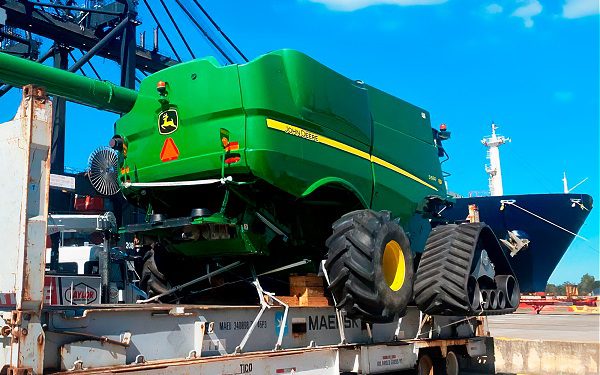he global logistics industry faces unique challenges when shipping farm equipment. Farm equipment shipping demands specialized attention as a critical component of U.S. trade, especially in the export and import sectors. Following is a comprehensive overview of the challenges and solutions in heavy equipment logistics, focusing on farm machinery.
The Expanding Market for Farm Equipment Shipping
The global market for farm equipment has seen significant growth, driven by the need for modernized agricultural practices and technological advancements in farming machinery. In 2022, the global agricultural equipment market reached USD 169 billion and is expected to reach USD 267 billion by 2030. The United States, a leading exporter in this sector, has seen a substantial increase in the demand for farm equipment shipping, growing from an estimated USD 37 billion in sales to a projected USD 51 billion by 2028. This increase is in traditional markets and emerging economies, where there is a growing need for advanced agricultural machinery.
Multi-faceted Challenges in Farm Equipment Shipping
There are several issues to consider when shipping heavy and oversized farm equipment domestically and internationally. These issues include:
- Handling Specialized Equipment: The sheer size and complexity of farm machinery require logistics providers to have specialized equipment and know-how. This includes handling oversized loads, understanding the machinery’s sensitivity, and the need for secure transportation.
- Navigating International Trade Regulations: The global nature of farm equipment shipping requires compliance with a myriad of international trade laws and regulations. These are made more complex by the varying requirements of different countries.
- Risk Management and Insurance: Transporting valuable and heavy farm equipment carries inherent risks. Managing these risks, including damage during transit and delays, is crucial. Adequate insurance coverage and risk mitigation strategies are essential components of the logistics process.
- Sustainable and Eco-friendly Practices: As environmental concerns become more prominent, there is a growing need to adopt sustainable practices in logistics. This includes reducing the carbon footprint of transportation and ensuring that logistics operations adhere to environmental standards.
Advanced Solutions and Strategic Approaches
When facing a variety of issues associated with moving heavy and oversized farm equipment, solutions to consider include:
- Customized Transport Solutions: To meet the unique needs of farm equipment, logistics providers must offer customized solutions. These may include multi-modal transportation, adaptation to the specific dimensions and weight of the equipment, and secure and efficient transit.
- Strategic Global Partnerships: Forming strategic alliances with global partners can enhance the efficiency of farm equipment shipping. This includes partnerships with local logistics providers, port authorities, and customs brokers to facilitate smoother transactions and reduce transit times.
- Technological Integration in Logistics: Integrating advanced technologies like AI, machine learning, and blockchain can revolutionize farm equipment logistics. These technologies can offer improved tracking, enhanced security, predictive analytics for route optimization, and streamlined documentation processes.
- Focus on customer-centric services: It is crucial to provide tailored services to meet clients’ specific needs. This involves offering flexible shipping options, providing regular updates, and ensuring transparency throughout shipping.
Economic Impacts and Future Trends
The logistics of farm equipment shipping impacts the agricultural sector and has broader economic implications. Efficient logistics operations can reduce costs, improve trade balances, and contribute to economic growth. Autonomous vehicles, drone technology, and increased digitization will likely transform the logistics landscape further.
In conclusion, the logistics of farm equipment shipping is a complex and dynamic field, integral to the success of global agricultural operations and the U.S. trade economy. Addressing its challenges requires a blend of specialized knowledge, innovative solutions, and a commitment to continuous improvement. As the demand for advanced agricultural machinery continues to rise globally, the logistics sector must evolve to meet these demands effectively and sustainably.
Atlantic Project Cargo is renowned for its expertise in transporting oversized agricultural and construction equipment worldwide. The company is pivotal in enhancing various sectors – especially agriculture – by implementing innovative and sustainable practices. The company’s services extend beyond mere transportation, significantly contributing to the expansion of businesses and supporting humanitarian efforts. This global impact underlines their commitment to improving the welfare of people and industries alike



